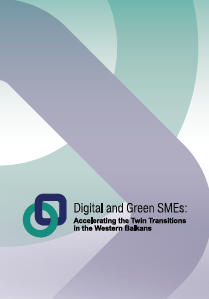Digitalising and Greening SMEs in the Western Balkans
Digital and Green SMEs: Accelerating the Twin Transitions in the Western Balkans is a project implemented by the OECD with the financial support of Croatia, designed to help all six Western Balkan economies sustainably digitalise their SME sectors and reach the targets set in the Digital and Green Agendas for the Western Balkans.
The project engages regional policy makers and experts in evidence-based mutual learning and multilateral dialogue in support of a co-ordinated approach to digital and green policy implementation in the region.
|
|
In the race to net-zero, Western Balkan economies face the challenge of accelerating both the digital and green transitions. These ‘twin’ transitions imply a shift towards a carbon-neutral economy that leverages digital technologies to improve competitiveness, resilience and well-being. While the twin transitions can reinforce each other, they are not automatically aligned, especially when SMEs lack the incentives to go green. In the EU alone, SMEs account for around 40% of business-driven emissions and for around half of business-driven energy consumption.
Despite the region's advancements and commitment to digitalisation across several sectors – from digital infrastructure to e-governance – WB6 economies often lag behind their peers in the EU and the OECD, in adopting more advanced digital transformation technologies. Simultaneously, as one of the regions in Europe most affected by air pollution and carbon dependency, the Western Balkans must ensure that the digital transformation of its business environment contributes to a greener, more sustainable and resilient future. Throughout 2024-2026, the OECD will support the Western Balkan economies accelerate the twin transitions and their convergence to EU and OECD standards.
|
Events High-Level Digital and Green Project Launch at Dubrovnik Forum, 28 June 2024 |
Relevant OECD work |
Related Documents



